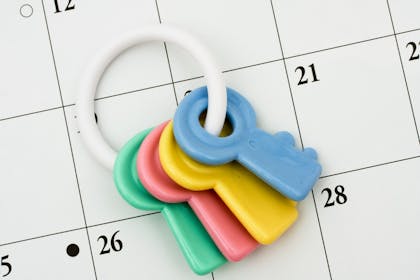11 things midwives wish we wouldn't do before giving birth
This page contains affiliate links, which means we may earn a small amount of money if a reader clicks through and makes a purchase. All our articles and reviews are written independently by the Netmums editorial team.
If you’re about to give birth, you’re probably feeling overwhelmed with excitement at the thought of meeting your baby. There’s just the little matter of labour to get through first …
And while it might be tempting to write an elaborate birth plan or go to hospital at the first twinge of a contraction, this could actually slow down your labour, according to midwife Sharon Trotter.
We spoke to Sharon for her top tips on the 11 things midwives wish mums about to give birth wouldn’t do.
FREE NEWBORN NAPPIES
11 things midwives wish we wouldn't do before giving birth

1. Don’t listen to the horror stories

There’s always one friend who has a birth horror story about being in labour for 48 hours. But if you're about to give birth, it's probably the last thing you need to hear.
Sharon says, ‘Labour can take a long time – 24 hours for a first labour isn’t uncommon. Some women may say they were in labour for 36 or 48 hours, but this is rare. You’re only in labour when you’re having regular painful contractions, which result in cervical dilatation.
'Remember that half the time – in between contractions – you will be pain free!’
2. Don’t wish your labour away

Yes it’s probably going to be painful. But labour – and birth – is an incredible experience.

Sharon says, ‘It is easy, after nine months of pregnancy to get impatient but try to let your body do what it's designed to do: birth your baby.
'In the latent phase of labour you may just need to go to sleep for a while. It might seem like an odd thing to do and you may worry your contractions are going to stop. But this is nature’s way of saving your energy for the big spurt at the end.’
3. Don’t worry if your baby is late

You’ve got your due date written on your calendar. But don’t worry if you go past it.
Sharon says, ‘It’s very common, especially with your first child, to be late. It’s not unusual to be seven, 10, or even 14 days late.
'Yet some women are desperate to be induced. If you are induced when you’re not ready to go into labour you’re more likely to need a birth intervention like forceps or an emergency C-section.’
4. Don’t go to hospital before you need to

It can be tempting to rush into hospital as soon as your contractions start. But Sharon advises staying at home for as long as possible.
She says, ‘Don’t go rushing in to hospital at the first contraction. This could cause your body to release stress hormones which can actually slow down labour. It’s far better to ring up the maternity ward first and ask for advice.
'As long as your waters haven’t broken and your baby's movements are normal for you, then chances are you’ll probably be advised to stay at home until your contractions are coming closer together or you need pain relief.'
5. Don’t confuse Braxton Hicks with labour

If it’s your first child it can be easy to confuse Braxton Hicks contractions with labour. Yet Sharon says it’s important to know the difference.
'You get Braxton Hicks throughout your whole pregnancy. That’s your uterus toning up for labour and it needs to do that.
'Some women think they are in labour but you’re only in labour when you have regular, painful contractions.’
6. Don’t get fixated on your birth plan

Giving birth is different for every woman. Which is why it’s important not to be totally fixed on your birth plan.
Sharon says, ‘Be realistic. You need to go into hospital with an open mind and listen to your instincts. Be prepared to be flexible if progress is slower than you had imagined.
'The most important thing is you have the person you trust most with you. It doesn’t matter who that is – it could be your mum, your partner, your doula or your midwife.
'If they understand what you want or don’t want, they can help to act as your advocate so make sure you explain your wishes to them before labour becomes established.’
7. Don’t listen to your mum friends

Every mum has a birth story and advice on what to do –and not to do – in labour. But Sharon advises concentrating on your own instincts.
She says, ‘Don’t think you have to do what other people suggest, or say worked for them. Do what’s right for you. And remember, that might be different to what your friends experienced.
'For example, if your body is telling you it wants to stay active, then walk around. Don’t feel you have to lie down if you don’t want to.'
8. Don’t be afraid to ask for a different midwife

It’s important you trust and feel comfortable with your midwife in hospital. If you don’t then it may be possible to ask for a change says Sharon.
She adds, ‘You can ask for someone else if you feel that the midwife you’re with is not giving you the care you think you deserve.
'You’ve got to feel happy with the people around you. If you feel secure then, everything is likely to go more smoothly. Don’t be afraid to speak up – it’s your baby and your body.’
9. Don’t be unprepared –physically or mentally – for labour

Giving birth takes a lot of energy and focus. So Sharon advises women to prepare themselves as much as possible.
She says, ‘Pregnancy massage, hypnobirthing classes and aqua natal classes can all be great ways to get your body ready for birth.’
10. But don’t overload yourself with information

While it’s a good idea to know what your body will do in labour, try not to overload yourself with information and try to have realistic expectations.
Sharon says, ‘Some women have read all the books and have a vision of what labour is going to be like. If their experience fails to live up to this 'dream birth' then it can affect their early weeks with their baby.
'As such, it may not always be a good idea to read too much.’
11. Don’t worry about doing a poo in labour

Yep, it’s one of the things mums-to-be worry about ... doing a poo in labour.
Sharon says, ‘Honestly, midwives have seen it all before. Don’t fret about doing a poo or being sick – it’s not worth worrying about.
'Labour is one day in your life. The pain is soon forgotten and, following the birth of your new baby, you will soon recover your dignity.
'You and your partner can now begin your parenthood journey together.’
Need some extra info? We recommend this pregnancy guide book for new and expectant parents. Called 'The Positive Birth Book' it offers a new approach to pregnancy, birth and the early weeks. It's mum-approved and available here at Amazon .
Disclaimer:
Research is constantly changing and whilst every effort is made by Sharon Trotter to ensure the information contained here is accurate and up-to-date, parents should be encouraged to seek the advice of their midwife, health visitor, lactation consultant or GP if they have any concerns.
This article contains affiliate links, which means we may earn a small amount of money if a reader clicks through and makes a purchase. All our articles and reviews are written independently by the Netmums editorial team.




